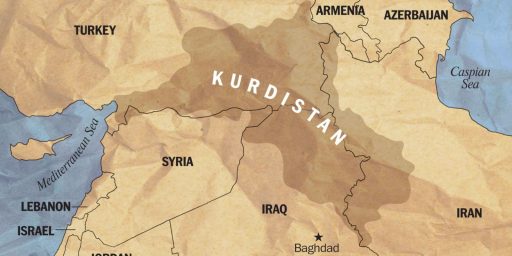Generals Offer Sober Outlook on Iraqi War
American generals in Iraq, while still optimistic of success, still worry about the ultimate ability of Iraqi forces to manage the situation in the near term.
Generals Offer Sober Outlook on Iraqi War (NYT)
American military commanders in Baghdad and Washington gave a sobering new assessment on Wednesday of the war in Iraq, adding to the mood of anxiety that prompted Secretary of State Condoleezza Rice to come to Baghdad last weekend to consult with the new government. In interviews and briefings this week, some of the generals pulled back from recent suggestions, some by the same officers, that positive trends in Iraq could allow a major drawdown in the 138,000 American troops late this year or early in 2006. One officer suggested Wednesday that American military involvement could last “many years.”
Gen. John P. Abizaid, the top American officer in the Middle East, said in a briefing in Washington that one problem was the disappointing progress in developing Iraqi police units cohesive enough to mount an effective challenge to insurgents and allow American forces to begin stepping back from the fighting. General Abizaid, who speaks with President Bush and Defense Secretary Donald H. Rumsfeld regularly, was in Washington this week for a meeting of regional commanders.
In Baghdad, a senior officer said Wednesday in a background briefing that the 21 car bombings in Baghdad so far this month almost matched the total of 25 in all of last year. Against this, he said, there has been a lull in insurgents’ activity in Baghdad in recent days after months of some of the bloodiest attacks, a trend that suggested that American pressure, including the capture of important bomb makers, had left the insurgents incapable of mounting protracted offensives. But the officer said that despite Americans’ recent successes in disrupting insurgent cells, which have resulted in the arrest of 1,100 suspects in Baghdad alone in the past 80 days, the success of American goals in Iraq was not assured. “I think that this could still fail,” the officer said at the briefing, referring to the American enterprise in Iraq. “It’s much more likely to succeed, but it could still fail.”
The officer said much depended on the new government’s success in bolstering public confidence among Iraqis. He said recent polls conducted by Baghdad University had shown confidence flagging sharply, to 45 percent, down from an 85 percent rating immediately after the election. “For the insurgency to be successful, people have to believe the government can’t survive,” he said. “When you’re in the middle of a conflict, you’re trying to find pillars of strength to lean on.” Another problem cited by the senior officer in Baghdad was the new government’s ban on raids on mosques, announced on Monday, which the American officer said he expected to be revised after high-level discussions on Wednesday between American commanders and Iraqi officials.
The problem here is that we haven’t truly identified an end game. We went in to topple Saddam Hussein’s regime and replace it with a democratic government that would be welcome in the family of nations. We did the first and have made major progress on the second.
Establishing civil society and ending the ablity of terrorists to attack soft targets is not something that can be done quickly. It’s also not something that can be imposed by outside forces. Now that there’s an Iraqi interim government in place, the responsibility for doing those things shifts to them, with the understanding that they will need support. Once the permanent constitution is written and the follow-on government is elected, U.S. forces will need to move completely into the background.
So long as there is a large U.S. military element conducting operations in Iraq, it will be hard to convince Iraqis that their elected government is truly in charge. At some point, relatively soon, the proverbial training wheels will have to come off.




The problem here is that we haven’t truly identified an end game. We went in to topple Saddam Hussein’s regime and replace it with a democratic government that would be welcome in the family of nations.
James, your characterization of why we went in to Iraq is at odds with Bush’s. As he said, quite unequivocally on the eve of the invasion (March 6, 2003):
“Our mission is clear in Iraq. Should we have to go in, our mission is very clear: disarmament. And in order to disarm, it would mean regime change.”
Well, the disarmament part was pretty easy since they didn’t have any arms to speak of!
Secondly, the regime has been “changed.”
It seems the “proverbial training wheels” should come off immediately since we’ve reached “mission accomplished.”
The War on Iraq was lost the moment Bush launched it. With our excellent militry Bush was able to win a few battles, but his decision to never have enough force to win the war guaranteed that this would be just like VietNam.